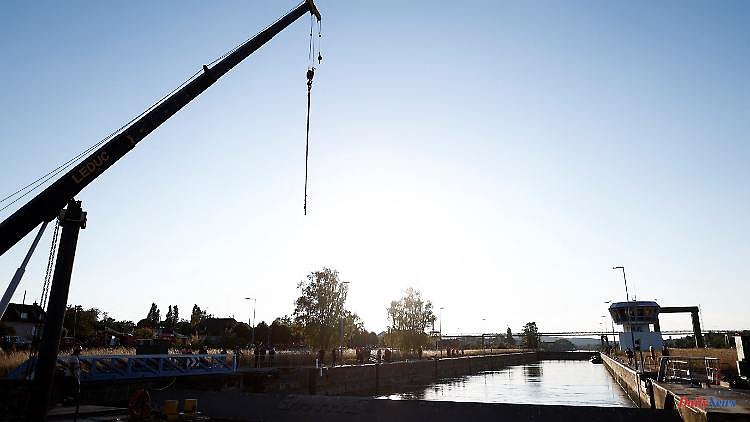A beluga whale got lost in the Seine and has been stuck in a lock in Normandy for days. He has no chance of surviving there. Animal rights activists come up with a bold idea for a rescue operation. At night, divers and other emergency services get to work.
French authorities have begun a delicate rescue operation for a beluga whale lost in the Seine. It started just before 10 p.m., according to the prefecture of the department of Eure in Normandy. After a final briefing, 24 divers from the police and firefighters went to a lock where the beluga whale is to be pulled out of the river and then taken by truck to a seawater pool.
"We will have done the maximum and the best possible," said the Secretary General of the Prefecture of the Department of Eure, Isabelle Dorliat-Pouzet. The rescue operation is not "self-perpetuating", it can cause stress in the whale, which can lead to death, she added.
The beluga whale was spotted in the Seine for the first time on Tuesday last week and has been stuck in a lock in Saint-Pierre-La-Garenne since Friday, around 70 kilometers from Paris - 130 kilometers from the Seine estuary on the English Channel. According to experts, the animal cannot survive long in the warm fresh water. Beluga whales typically live in arctic waters off the coasts of Russia, Alaska, and Canada.
Animal rights activists therefore developed the idea of pulling the four-meter-long and around 800-pound marine mammal out of the river and transporting it to a seawater tank in order to feed it up and then release it in the sea. The interest and the willingness to donate in France are huge. Among others, the marine protection organization Sea Shepherd collected donations for the rescue operation. Above all, ropes, nets and mattresses are needed.
But the plan is anything but simple: A major problem is that the banks of the Seine at the lock are not accessible to vehicles, said expert Isabelle Brasseur from Zoo Marineland in Antibes, southern France, who was in Saint-Pierre-la- Garenne had arrived to prepare the rescue operation. Therefore, everything has to be done "by hand".
In the past few days, several attempts to feed the emaciated and weakened animal had been unsuccessful. According to experts, his lack of appetite could be a sign of illness. The whale will be monitored by veterinarians throughout the rescue operation. Brasseur said his health is currently "satisfactory". Beluga whales are three to six meters long and weigh between 400 and 1000 kilograms. They feed on fish, mussels and crustaceans.
According to experts, it is only the second time that a beluga whale has lost its way to France. The first time a fisherman spotted a whale in his nets in the Loire Estuary was in 1948. In Germany, a specimen swam the Rhine in 1966. When he reached Bonn he turned and found his way back to the open sea.












